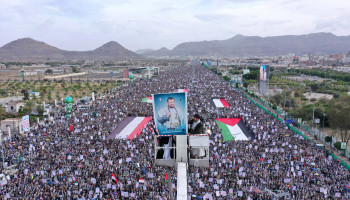The Humanitarian Affairs Administration Council reveals the role of the United Nations in the suffering of the Yemeni people
الأحد, 28 مارس 2021

Quting from YPA, the Secretary-General of the Supreme Council for Management and Coordination of Humanitarian Affairs, Abdulmohsen Tawoos, said on Sunday that 24.8 million people, 67 percent of Yemen population, need food aid due to the war and siege on Yemen for six years.
Tawoos affirmed that about 5.1 million people are “a step away from famine”, pointing out that the Saudi-led coalition attacks have caused the displacement of 4.5 million people, including 58 percent of the displaced families living in cold and extremely cold areas.
He added that six years of war and siege have also caused 16 million people to need health services, among them 11 million people are in dire need of health care and medicine, while four million children suffer from malnutrition, and a million pregnant and lactating women suffer from acute malnutrition.
Regarding the education sector, Tawoos said that nearly half a million students are in urgent need of emergency aid, and one million displaced children need support in the field of education, after the coalition destroyed more than 2,500 educational facilities, in whole and part.
“The United Nations organizations have not interacted adequately with the endeavor to alleviate the suffering of the Yemeni people and have focused on activities that do not serve the need,” Tawoos said. “For six years, we have not seen or touched a serious move by the United Nations to stop the aggression on Yemen, but it has tended to barter the humanitarian side for the political and military in many cases.”
As the deteriorating humanitarian situation reaching its climax, the United Nations took several measures that further exhausted the humanitarian situation in Yemen, he explained.
Tawoos revealed that the World Food Program (WFP) had reduced the periodic distribution of food to 50 percent and thus paved the way for the use of food as a political and military card by the coalition, far from any humanitarian considerations.
In the health sector, Tawoos noted that international organizations worked to produce a state of collapse in the health system through its sudden withdrawal from hundreds of health facilities without any solutions or timeliness.
He also referred that the reduction and stopping of the fuel needed to operate the water and sanitation institutions by UN organizations constituted a real disaster.
Concerning food aid to the population, he uncovered several cases in which UN organizations had introduced food and health materials in kind that were about to expire.






